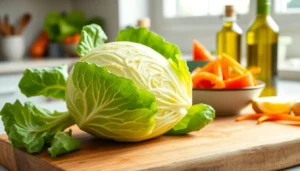Table of Contents
ToggleFinding nutritious meals for toddlers can feel like a daunting task for many parents. With their ever-changing tastes and preferences, it’s crucial to create balanced meals that not only satisfy their hunger but also support their growth and development. Healthy toddler meals don’t have to be boring or complicated; they can be colorful, fun, and packed with essential nutrients.
Exploring a variety of ingredients is key to keeping little ones engaged at mealtime. From vibrant fruits and vegetables to whole grains and lean proteins, there are countless options to make every meal an adventure. By incorporating simple yet delicious recipes, parents can instill healthy eating habits that last a lifetime.
Importance Of Healthy Toddler Meals
Healthy toddler meals play a crucial role in early development. Balanced nutrition supports physical growth, cognitive development, and immune function. Nutrient-dense foods supply essential vitamins and minerals critical for toddlers during their growth phases.
Healthy meals promote good eating habits. Children who consume diverse, nutritious meals are more likely to maintain healthy eating patterns into later life. Exposure to various flavors and textures can lead to an increased willingness to try new foods, enhancing their dietary variety.
Toddler meals rich in fruits, vegetables, whole grains, and lean proteins can significantly influence energy levels and mood. Balanced diets contribute to sustained energy throughout the day, improving focus and emotional stability.
Parents seeking healthy toddler meals can benefit from understanding specific components. Incorporating a wide array of colorful foods not only enhances appeal but also ensures a broad spectrum of nutrients. Simple recipes with engaging presentations help make nutritious eating an enjoyable experience for toddlers.
Nutritional Needs For Toddlers

Toddlers require a balanced diet full of essential nutrients to support their rapid growth and development. Understanding these nutritional needs helps parents provide meals that promote health and well-being.
Essential Nutrients
Essential nutrients for toddlers include proteins, carbohydrates, fats, vitamins, and minerals.
- Proteins: Crucial for growth and tissue repair, proteins come from sources like lean meats, dairy, beans, and eggs.
- Carbohydrates: Provide necessary energy, carbohydrates are found in fruits, vegetables, and whole grains.
- Fats: Support brain development, healthy fats are present in avocados, nuts, and fish.
- Vitamins: Key vitamins, especially A, C, D, and B vitamins, enhance immune function and support healthy skin and vision; they come from fruits, vegetables, and fortified foods.
- Minerals: Calcium and iron are vital for bone health and blood production; dairy products and leafy greens supply calcium, while meats and legumes provide iron.
Common Deficiencies
Common deficiencies among toddlers may lead to health issues.
- Iron: Insufficient iron intake can result in anemia, characterized by fatigue and weakness. Good sources include lean meats, beans, and fortified cereals.
- Vitamin D: A lack of vitamin D can lead to weakened bones. Exposure to sunlight and foods like fortified milk can increase levels.
- Calcium: Low calcium intake may hinder bone development, so dairy products and leafy greens can help meet needs.
- Fiber: Inadequate fiber consumption may cause digestive issues. Whole grains, fruits, and vegetables can enhance fiber intake.
- Vitamin A: Deficiency can lead to vision problems and weakened immunity. Carrots, sweet potatoes, and leafy greens provide this essential vitamin.
Ideas For Healthy Toddler Meals
Healthy meals for toddlers should be balanced, colorful, and appealing to encourage nutritious eating habits. Here are some creative ideas categorized into breakfast, lunch, and dinner options.
Breakfast Options
- Oatmeal with Fruit: Cook rolled oats and top with sliced bananas, berries, or diced apples for added fiber and vitamins.
- Smoothie Bowls: Blend spinach, yogurt, and banana, and serve in a bowl topped with granola and assorted fruits.
- Whole Grain Pancakes: Use whole wheat flour to make pancakes and add mashed bananas or blueberries for natural sweetness.
- Greek Yogurt Parfait: Layer Greek yogurt with mixed berries and a sprinkle of granola for a protein-rich breakfast.
Lunch Ideas
- Veggie Wraps: Fill whole grain tortillas with hummus, shredded carrots, spinach, and sliced bell peppers for a crunchy bite.
- Mini Pita Pockets: Stuff mini pita breads with grilled chicken, cucumbers, and tzatziki sauce for a fun and flavorful meal.
- Quinoa Salad: Mix cooked quinoa, cherry tomatoes, diced cucumbers, and feta cheese, dressed with olive oil and lemon juice.
- Homemade Vegetable Soup: Blend various vegetables like carrots, peas, and potatoes into a nutrient-dense soup with whole grain bread on the side.
Dinner Suggestions
- Baked Salmon: Serve baked salmon fillets with steamed broccoli and sweet potato for healthy fats and vitamins.
- Chicken Stir-fry: Sauté diced chicken breast with mixed vegetables such as bell peppers and snap peas, served over brown rice.
- Lentil Tacos: Use seasoned lentils as a filling for taco shells, topped with avocado, cheese, and salsa for added flavor.
- Stuffed Bell Peppers: Fill bell peppers with a mixture of brown rice, lean turkey, and diced tomatoes, then bake until tender.
Tips For Encouraging Healthy Eating
Encouraging healthy eating habits in toddlers requires creativity and engagement. Parents can utilize various strategies to make nutritious choices more appealing.
Involving Toddlers In Meal Prep
Involving toddlers in meal preparation fosters a sense of ownership over their food choices. Engaging them in selecting fruits and vegetables at the grocery store promotes curiosity about different flavors and textures. Allowing toddlers to help with washing produce, stirring mixtures, or arranging food on plates enhances their interest in meals. Simple tasks, like choosing toppings for yogurt or assembling their sandwiches, can make the cooking process fun and educational. This participation not only boosts their willingness to try new foods but also nurtures basic cooking skills early on.
Making Meals Fun
Making meals visually appealing and interactive can significantly enhance a toddler’s willingness to eat healthily. Utilizing colorful fruits and vegetables creates a vibrant plate that attracts attention. Presenting food in fun shapes, such as star-cut sandwiches or rainbow fruit skewers, adds excitement to the dining experience. Incorporating dips, like hummus or yogurt, encourages toddlers to explore different flavors. Creating themed meals, such as taco night or breakfast-for-dinner, can make eating feel like an event. These playful approaches can transform mealtime into an enjoyable occasion, promoting healthy eating habits in a positive environment.
Healthy meals for toddlers play a vital role in shaping their future eating habits and overall well-being. By focusing on balanced nutrition and incorporating a variety of colorful ingredients, parents can make mealtime enjoyable and engaging. It’s essential to prioritize nutrient-dense foods that support growth and development while fostering a positive relationship with food.
Encouraging toddlers to explore new flavors and textures not only enhances their palate but also contributes to their physical and emotional health. With simple strategies and creative meal ideas, parents can lay the foundation for lifelong healthy eating habits. Making mealtime a fun and interactive experience helps instill a love for nutritious foods that can last a lifetime.




